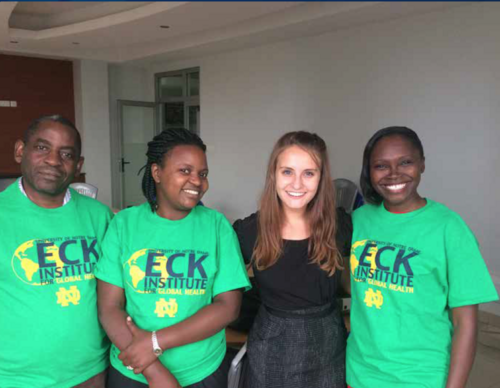
Indiana is in the bottom 10 states for infant mortality with a 2016 infant mortality rate (IMR) of 7.5. This means more than seven children die out of every 1,000 births. Unfortunately, St. Joseph County’s IMR was even higher, with an 8.2 IMR average from 2012 to 2016. To better understand what can be done to decrease this rate, Elizabeth A. McCue, a global health research associate for the Eck Institute for Global Health at the University of Notre Dame, has teamed with the St. Joseph County Health Department to assess local health initiatives and see where they are most effective and how they could be improved.
McCue’s experience with infant health began as a candidate of the Master of Science in Global Health program at the University of Notre Dame. Her capstone project included spending seven weeks in rural health facilities in Uganda, collecting case-specific data about infants who had died during delivery. Through collaboration with Saving Mothers, Giving Life Uganda, she was able to identify several factors that contribute to an exceptionally high rate of stillbirths in a specific region.
Working in Uganda presented distinct challenges, including a lack of health record collection and storage systems, for McCue. She was, however, able to utilize this experience in her current role. In discussing how McCue’s community work relates to global health, Bernard Nahlen, director of the Eck Institute, said, “Community health is often an indicator of greater public health concerns, and for researchers to address global health issues like IMR, it is imperative for solutions to be tailored to community needs. The Eck Institute has sent research associates to many countries around the world, but St. Joseph County also faces global health issues that we want to help combat.”
For the IMR initiative in St. Joseph County, McCue began collecting data that helped summarize the most pertinent factors for infant mortality in the community. Her findings showed quality health care both prior to conception as well between pregnancies is critical for preventing premature births in the county. For example, it is ideal for women to wait 18 months between pregnancies. This research, which also included a report and map of where infant mortality is most saturated, was then submitted to the Fetal-Infant Mortality Review program for consideration.
“When people think of infant mortality – death before age 1 – they might think of sudden infant death syndrome (SIDS) or sudden unexpected infant death (SUID), accidental deaths or infections,” said McCue. “However, most of the babies who die before their first birthday never leave the hospital. Complications of prematurity are the biggest cause of death for infants in St. Joseph County.”
Life planning is a major topic that McCue also discusses in her work with the St. Joseph County’s Juvenile Justice Center. At the facility, she focuses on supporting high-risk youth in the county by helping create a comprehensive adolescent health curriculum. The lessons cover many topics including physical and mental health, overall well-being and healthy relationships. The goals of the lessons are to ensure the students have access to the information and resources they need to live a healthy life.
“McCue’s latest work for the St. Joseph Health Department has been an important asset to our local community,” said Heidi Beidinger-Burnett, assistant professional specialist of biological sciences. “She is a great example of a Master of Science in Global Health graduate who has been able to utilize her academic experience in the workforce.”
The Master of Science in Global Health program provides an engaging science-centric training in the context of global health. The program focuses on providing students with a working knowledge of global health challenges and offers opportunities to students to use new skills and conduct various kinds of research.
“Conducting research for my capstone project helped me grow my skills and confidence for my role at the St. Joseph County Health Department,” said McCue. “Not only did I learn to overcome a number of challenges that were presented to me while in Uganda, but it also helped me develop a passion for maternal and child health and realize how that passion could be applied elsewhere.”
McCue’s two-year position as a global health research associate will finish in August 2018. To learn more about the Eck Institute for Global Health and the Master of Science in Global Health program, including how to apply, visit https://globalhealth.nd.edu/.
Contact: Brandi R. Klingerman, research communications specialist, Notre Dame Research, 574-631-8183, bklinger@nd.edu; @UNDResearch
Originally published by at research.nd.edu on May 29.